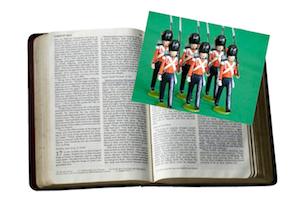 Richard Dawkins (thanks Rex), in his attack on Christianity called The God Delusion, famously wrote:
Richard Dawkins (thanks Rex), in his attack on Christianity called The God Delusion, famously wrote:
The God of the Old Testament is arguably the most unpleasant character in all fiction: jealous and proud of it; a petty, unjust, unforgiving control-freak; a vindictive, bloodthirsty ethnic cleanser; a misogynistic, homophobic, racist, infanticidal, genocidal, filicidal, pestilential, megalomaniacal, sadomasochistic, capriciously malevolent bully.
That’s not a surprising quote from an atheist. The fact is, however, I think a lot of Christians would offer an “Amen” to that statement, whether they whisper it or openly proclaim it. Reminds me of the old joke about the Sunday School teacher who was similarly describing God in those terms when one of her students popped up and said, “But then He became a Christian.”
In the churches of Christ, there are a lot of Marcionists. I’ve described what I consider to be one of the low points of my ministry, when I failed to defend a young man who was attacked by a preacher. The young man had dared to quote the Psalms during a discussion, and this longtime preacher cut him off, saying, “My Bible says it’s been nailed to the cross.”
I know it seems antiquated, unintellectual, and naive, but I take a high view of Scripture. I believe the Bible to be the Word of God. I believe that the whole Bible is inspired. I personally feel that many of our problems come from trying to make the Bible into something that it’s not, trying to make it a law book or a science book or a history book. It’s none of those and isn’t meant to be read like any of those. It’s not even a love letter, which has been popular the last few years. It’s a collection of writings, of different genres. But above all, it’s a holy book and needs to be read as such.
I take Paul’s words to Timothy in 2 Timothy 3 very seriously. I know that he was writing specifically about the Old Testament, but I don’t have a theological problem with applying them to the rest of Scripture:
“But as for you, continue in what you have learned and have become convinced of, because you know those from whom you learned it, and how from infancy you have known the holy Scriptures, which are able to make you wise for salvation through faith in Christ Jesus. All Scripture is God-breathed and is useful for teaching, rebuking, correcting and training in righteousness, so that the man of God may be thoroughly equipped for every good work.” (2 Timothy 3:14-17)
It’s all inspired. It’s all useful. It can make me wise for salvation and thoroughly equip me for what I need to do. The Old Testament and the New Testament.
I willingly and intentionally place myself under Scripture. I don’t seek to master the Bible; I seek to be mastered by the Bible. When there is something I don’t understand, I place the blame on me and not on Scripture. When there is something I don’t agree with, I accept that I’m wrong. Again, I know that it’s popular to scoff at such a view. Feel free to scoff. As the commercial says, I’m comfortable in my own skin. I’m comfortable with my relationship with Scripture. And I’m comfortable in my belief in God.
Like this:
Like Loading...
 Where united Israel had been able to hold its own against the surrounding nations, the divided kingdom of Israel and Judah had little chance of survival. Even the kings that came to have some military success could only boast of reclaiming the territory which David had previously conquered.
Where united Israel had been able to hold its own against the surrounding nations, the divided kingdom of Israel and Judah had little chance of survival. Even the kings that came to have some military success could only boast of reclaiming the territory which David had previously conquered.


